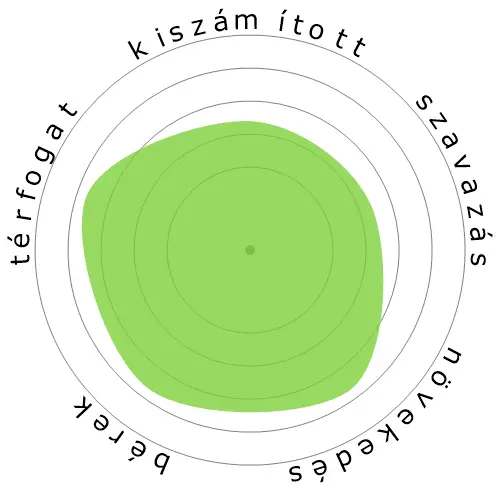Személyi pénzügyi tanácsadók




Az emberek ezt is megtekintették
Számított automatizálási kockázat
Közepes kockázat (41-60%): A közepes automatizálási kockázattal járó foglalkozások általában rutinszerű feladatokat tartalmaznak, de még mindig szükség van némi emberi ítélőképességre és interakcióra.
További információ arról, hogy mi ez a pontszám, és hogyan számítják ki, elérhető itt.
Felhasználói szavazás
Látogatóink szavaztak, és nem biztosak abban, hogy ez a foglalkozás automatizálásra kerül-e. Ezt az értékelést tovább erősíti a kiszámított automatizálási kockázati szint, amely 43% esélyt becsül az automatizálásra.
Mit gondol, milyen kockázatai vannak az automatizációnak?
Milyen valószínűséggel fogják Személyi pénzügyi tanácsadók robotok vagy mesterséges intelligencia helyettesíteni a következő 20 évben?
Érzelem
A következő grafikon mindenhol szerepel, ahol jelentős mennyiségű szavazat áll rendelkezésre, hogy értelmes adatokat lehessen megjeleníteni. Ezek a vizuális ábrázolások az időbeli felhasználói szavazási eredményeket mutatják, jelentős jelzést adva a hangulat trendjeiről.
Érzelem az időben (évente)
Növekedés
A(z) 'Personal Financial Advisors' munkahelyi nyitások száma várhatóan 17,1%-kal nő 2033-ra.
Teljes foglalkoztatottság és becsült állásnyitások
A frissített előrejelzések 09-2025 időpontban esedékesek..
Bérek
A(z) 2023-ban a 'Personal Financial Advisors' éves középfizetése 99 580 $ volt, vagyis 47 $ óránként.
'Personal Financial Advisors' magasabb összeget kaptak, mint az országos mediánbér, ami 48 060 $-n állt.
Bérek az idők folyamán
Térfogat
2023 időpontjában 272 190 ember dolgozott 'Personal Financial Advisors' munkakörben az Egyesült Államokban.
Ez körülbelül a 0,18% -át képviseli az országban foglalkoztatott munkaerőnek.
Másképp fogalmazva, körülbelül minden 557. ember 'Personal Financial Advisors'-ként dolgozik.
Munkaköri leírás
Tanácsot adunk ügyfeleinknek pénzügyi tervekről, adózási és befektetési stratégiák, értékpapírok, biztosítások, nyugdíjtervek és ingatlanok ismeretének felhasználásával. Feladataink közé tartozik az ügyfelek vagyontárgyainak, kötelezettségeinek, pénzforgalmának, biztosítási fedezetének, adózási helyzetének és pénzügyi céljainak felmérése. Szükség esetén vásárolhatunk és eladhatunk pénzügyi eszközöket az ügyfelek számára.
SOC Code: 13-2052.00


Megjegyzések
Leave a comment
How can one relate to a line of code, or trust that the programmers inherent biases are not skewing the results?
I’m completely on the fence when it comes to which jobs and when AI will replace the human workforce. I don’t underestimate the ambitions of tech producers and the average human being's preference for the quick, easy, and cheaper option to bring about such a situation. And let’s not forget how far technology has come since the Internet, let alone the simple calculator.
All this said we shouldn’t think that the scenario where AI could replace the human workforce is one that’s predetermined. “We” (everyone single one of us) have the collective ability to cause or prevent such an eventuality. We must also consider how viable an AI-dominated society and economy would really be. Every government across the globe would have its hands cut out with a population whose majority is unemployable. Imagine the civil unrest? Another consideration is the damage this could do to the economy; if a massive portion of humanity isn’t working, and isn’t getting a wage like they used to, we would see an unprecedented reduction in the flow of money around the economy. And what happens to money when there is a lack of exchange taking place? Doesn’t the value of money decrease? The financial advisors in this forum would be the best to elaborate on this or to correct my statement.
In conclusion: while I have no doubt that the ambitious tech lords and their acolytes will do what they can to bring about an AI world, the question of whether humans from governments to ordinary citizens will allow it is another thing altogether.
For example, look at what services SoFi offers on their brokerage it's revolutionary. When you first heard "stonks always go up brrrrr" then that was the exact point the financial advisors and other various staff felt the chill up their spine of oncoming obsolescence.
Like Librarians in 2004 though, if you have the job now you won't even consider retirement for 15 years you're good. Are Advisors being used by Millennials and Gen Zoomer? I really am beginning to doubt it highly, they will just put all their money in SPY, QQQ, SOXL, REITs and move on with their lives.
Robots didn't kill Advisors but technology did and the ETF.
Lot of emotional intelligence in planning.
AI will just make planners better.
The staff are unhelpful and untrained, cannot answer simple questions and it seems the solution to a problem is to call the call centre which I could do from home.
A physical visit to the bank is deliberately discouraged by management - it is not possible to find a manager in a bank.
Not much fun and clearly a strong incentive by the bank owners to discourage visits which will reduce the number of staff required. I do not see 'brick and mortar' banking surviving.
Most questions are dealt with through the call centre and I see this as the future. This can be fairly easily changed to a 'press 1 for...' system which once again removes the requirement for staff.
The service industries such as banking are ripe for automation. I think Digital Banking will change the requirement for a visit to the bank. What do you think?
All the best,
Mr. Planner.
Hagyjon egy választ erről a foglalkozásról